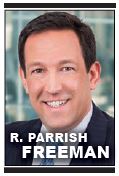By R. Parrish Freeman
As the legendary racecar driver Ricky Bobby once said, “If you ain’t first, you’re last!” Couple of problems with that. First, Ricky Bobby doesn’t exist, except in our hearts. Second, he’s just wrong. If you’re not first, you could be second, third, fourth or anywhere else in front of last place. But Ricky’s misguided motto is not completely worthless. It’s an opportunity for that most dreaded and reviled of all moments (if you are my kids): the teaching moment.
Ricky’s guiding philosophy reveals a false belief held by many when it comes to their ideas — that being first is everything. If you have the idea first and move on it, there is an emotional but understandable belief that it belongs to you and that no one else should be allowed to copy you. It’s just not true.
First, the law actually favors copying. It’s good for competition. But the law also wants to foster innovation and creativity, which is why there are carve-outs that provide exclusivity in certain circumstances. Being first can certainly matter, but it’s not the only thing. Your idea — what the law calls your “intellectual property” — needs more than being first in order to get you to exclusivity. What that something is depends on your idea.
If your idea is for something new and useful, a patent can get you exclusivity for up to 20 years. In exchange, you have to include enough detail in the patent to allow people to avoid making or using the invention while the patent is in force and, conversely, to be able to freely use the technology of the patent after it expires.
If your idea is a story or other original expression, you own a copyright in the particular words or original images you use. You don’t have to apply for copyright protection; it exists from the moment of creation. But you do have to register your copyright to enforce it in court, and you do not get to stop others from using the same idea. Copyright does not protect ideas, just the expression of the idea. But you do get exclusivity over your work, substantially similar works and works derived from the work you created.
If your idea is just a word or clever slogan, you have to use it in connection with marketing or selling a product or service to gain exclusive rights. Such use gets you trademark rights in the word or slogan. On the other hand, simply coming up with a clever slogan, a new or interesting word or a play on words gets you nothing. No exclusivity exists without actual use with a good or service, regardless of whether you are first and regardless of how clever your wordplay.
You can gain exclusive rights over the look and feel of your product or its packaging — its trade dress — in much the same way as with trademarks. Rights follow use. But there are limits. The chosen design or packaging must serve primarily as a source identifier. For example, is the product’s size and shape driven by aesthetics or by a need to fit comfortably in the palm of one’s hand? The former may be your exclusive trade dress; the latter, not so much.
Finally, there are trade secret rights. Being first here doesn’t matter because your rights, and your exclusivity, stem from the fact that you keep it secret. The recipe for Coca-Cola is an example. It derives value from the fact that no one knows (or can deduce) what it is, except those who are sworn to secrecy. Still, the rights are exclusively yours so long as you take reasonable measures to keep the thing secret, whether it’s a manufacturing method, a chemical formula or just about anything else.
The point of all of this is to say, “Don’t rest on your laurels.” You accomplished something by being first with a great idea. Ricky was wrong to think you’re last just because you’re not first. He was also wrong to think that being first is all you need to do. You can’t count on being first to get you to exclusivity. But if you take the required next steps, exclusivity can be yours.
R. Parrish Freeman is a partner in the Park City office of Maschoff Brennan. His practice centers on intellectual property law and he has extensive experience in enforcing and defending intellectual property rights for his clients.








